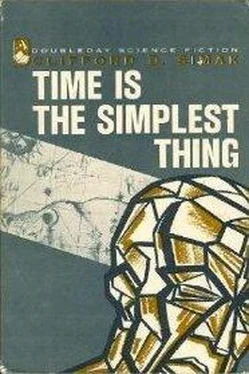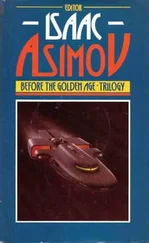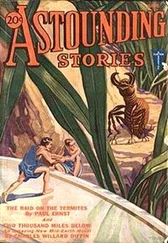And there, close to the door, was the battered, broken truck which had found its rest at last, and the gleaming star machine that it had carried.
Walking as softly as he could, Blaine moved across the floor and stood beside the machine, shining his light upon it. And it was something that he knew well, it was a machine that back in Fishhook he had known intimately. There was a strange beauty in it, he told himself as he stood and looked at it, almost as if one could see, reflected in its surface, the far reaches of the universe to which it could help a man to go.
But it was old — one of the older models that Fishhook had replaced some ten years or so ago, and there was little doubt, he knew that it had somehow come from Fishhook. There must be many of the older models such as this stacked away in some almost forgotten storehouse, stored there more than likely because it was easier to store them than it was to break them up. For something such as this must either be stored under lock and key or it must be broken up, for they could not be simply thrown away. In this machine lay the key to Fishhook’s monopoly and there must be no possibility that one of them should fall into any other hands.
But one of them had fallen into other hands and here it lay tonight, mute evidence of one of the smartest, slickest bits of intrigue to which Fishhook, intrigue-ridden as it was, had ever been unwitting party.
Blaine tried to imagine how Stone had ever managed, and thinking of it, his admiration for the man rose a notch or two. It had taken money, surely, and it had taken trusted agents and it had required a plan of operation which would countenance no slip-up.
He wondered vaguely, as he stood there, how much Harriet might have had to do with it. Certainly, he told himself, she had had no qualms, in the process of smuggling him from Fishhook, of getting out herself. She was, he thought, just the kind of woman who could engineer a thing like this — self-possessed and calm and with a sure and certain knowledge of all those inner workings which made Fishhook keep on ticking. And with a mind that operated with the fine precision of a good Swiss watch.
Stone had had great hopes of this machine and now the hopes were gone. Now Stone was dead and the star machine lay here in this abandoned shed, a showpiece bit of evidence for a man so filled with hate that he would destroy paranormal kinetics, root and branch and leaf.
And Finn could make much of this machine, for while it might be called machine, it was not the kind of machine to which the human mind for centuries has become accustomed. It had no moving parts and it had no function that was discernible. It was designed to work upon nothing more material than the human mind and senses. It worked with symbolism rather than with energy — and yet it worked. Just as a rosary in the hands of the devout had worked for centuries before there had ever been a thought of such a thing as a paranormal human.
If the hope were gone, thought Blaine, then the machine could not remain. If he owed Stone nothing else, he owed him that much at least. He owed him, he reminded himself, some slight repayment for that night he’d phoned.
There was a way — there was a way, he knew, if out of the frothing sea of alien knowledge which surged inside of him he could only pull it forth.
He sought for it and found it and in the finding of it he touched on other knowledge, all neatly docketed and primly pigeonholed, as if some filing clerk had been busily at work within his cluttered mind.
He stood weak and trembling at the discovery of this pigeonholing, for he had not known, had had no inkling that it was going on. But it was the human way, he told himself — it was an evidence of human rebellion against the piecemeal disorderliness of the mass of data which had been dumped into his mind by the creature on that distant planet.
The creature still was with him, or the essence of the creature, and he hunted for it among the pigeonholes, but it was not there; there was no sign of it as such, but there was something else; there was something very wrong.
Startled, he went scrambling on the trail of wrongness and he caught and held it, muzzling it with a nose of horror — for it was simply this: His mind no longer was an entirely human mind. And in the edge of terror was the terrible wonder of how he still retained enough pure humanity to know this was the case.
He put out his hand in a blind and groping way and caught a corner of the star machine and held tightly onto it.
It all spelled out, he suspected, to the simple fact that he remained human, or mostly human, on the surface, while beneath that surface was a fusion of two individuals, of the knowledge and perhaps the ethics and the motives of two different forms of life. And that made sense when one thought of it, for the Pinkness had not changed, it had stayed its sprawling, slobby self; there had been no trace of human in it, although inside of it was a certain portion of humanity and God knew what else besides.
He released the grip he had upon the star machine and ran his hand against the glasslike smoothness of its metal structure.
There was a way — if he could only do it. He had the knowledge now, but did he have the technique?
Time, the Pinkness had told him — time is the simplest thing there is. But still, Blaine told himself, not as easily handled as the creature had made out.
He stood there thinking, and the thing that he must do became very clear indeed.
The past was a worthless path to follow, for the machine was in the past already. It had left a long and nebulous trail clear across the past.
But the future was a different matter. If it could be moved into the future, this present moment and all succeeding present moments would then become its past and all that would remain would be the ghostly track of it — and a laughter and a mocking and a thing of magic which would make no proper subject for a rabble-rousing sermon by a man named Lambert Finn.
And more than that, thought Blaine, it would, more than likely, scare the hell right out of him.
He reached out with his mind to encircle the machine and it was no use. His mind would open up and reach, but there was a lack of stretch in it and he could not take in all of the machine. So he rested and then he tried again.
There was a strangeness and an alienness in the shed he had not noticed, and there was an unknown menace in the scraping of the weeds outside the broken window, and the air held a sharpness and a tang that raised bristles on his neck. It was most confusing, for suddenly it seemed that he had lost all rapport with this world in which he found himself and that nothing, not the earth he stood on nor the air he breathed or even the body that he wore was anything he’d ever known before and there was a horror in this lack of familiarity, in this shift from the known which he no longer could remember into this unknown for which he had no focal points. But it would be all right, it all would come aright if he could move this strange artifact he held within his mind, for it had been for this purpose that he had been called forth from the darkness and the warmness and the snug security and if he got the job done he could go back again, back to his memories of other days and his slow assimilation of new data and the miser-satisfaction of counting up the new facts, one by one, as he piled them in neat stacks.
The artifact, for all its strangeness, was an easy thing to handle. Its roots did not run back too far and the coordinates were falling very satisfactorily into place and he almost had it made. But he must not hurry despite his screaming need to hurry; he must somewhere snare some patience. So he waited for the co-ordinates to go clicking into place and he made exact and unhurried measurement of the temporal strain and he gave the thing a twitch at just the right degree of twist and it was exactly where he had wanted it.
Читать дальше








